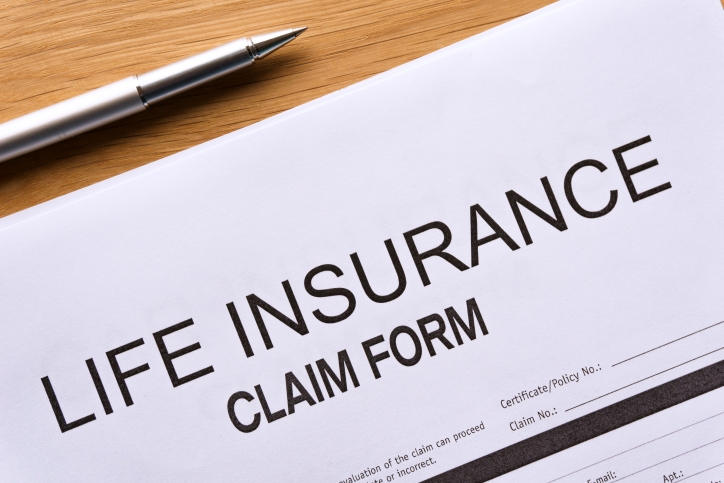BEST Life Insurance Claims Lawyer Near You in Louisiana
Life insurance company holding onto your money? Life insurance agrees to pay a certain amount of money to a beneficiary in exchange for payment of a premium upon the death of the insured. However, life insurance companies only make money if they pay out less in life insurance benefits than they take in premiums. Life insurance companies hold onto other people’s money by not informing beneficiaries that policies exist and by denying claims made by known beneficiaries.
When you need the best life insurance lawyer in Louisiana, contact the expert team at Lavis Law Firm – Personal Injury & Accident Attorneys. They have over 23 years of experience in fighting insurance companies on denied and delayed claims. Let us fight for you. FREE CASE REVIEW. A+ Rating with the Better Business Bureau. Contact us now to discuss your case at no charge.
Jump to a Section:
Toggle[lwptoc]

What Happens When an Insured Person Dies, but the Beneficiary Never Comes Forward?
If an insured person dies and the beneficiary never comes forward because they don’t know the policy exists, usually nothing happens at all! The insurance company holds onto the money and continues to use the beneficiary’s money to the insurance company’s own benefit until the policy is discovered and the claim made.
Insurance companies have actual knowledge in their files that people they insure have died, yet they neglect to initiate an investigation and pay the claim. The beneficiary never comes forward because he or she doesn’t know the policy exists. As your life insurance claim lawyer inn Louisiana will explain, there is no Louisiana penalty to discourage this dishonest practice. Unfortunately, Louisiana has failed to pass an Unclaimed Life Insurance Benefits Law that would require life insurers to search the Social Security Administration death master file and provide payment of benefits to beneficiaries. What can be done in the meantime while waiting for the Louisiana Legislature to act?
- When you purchase a policy, inform your named beneficiary;
- If you think you may be a beneficiary, search for the life insurance policy online;
- Contact your Louisiana Legislators to let them know you want an Unclaimed Life Insurance Benefits Law in Louisiana for consumer protection.
Also read: What Happens If The Applicant Dies Before The Insurance Policy Is Issued?

Double Indemnity Insurance Claims
Double indemnity clauses are often found in life insurance policies and are a form of accidental death insurance because it typically requires the insurer to pay double the face value of the life policy to the beneficiary in the event of accidental death.
Are There Cases Where the Life Insurance Company Denies Payment?
Even when the insured dies and the beneficiary knows of the policy and makes a claim, the beneficiary may encounter other problems where the life insurance company denies payment and you may require the expertise of a life insurance claims lawyer in Louisiana. The four primary areas where beneficiaries encounter denials are:
- Death during the contestability period;
- Type of death not covered under the policy;
- Failure of the insured to disclose relevant personal information; and
- Failure to timely pay policy premiums;
- Contestability period– the two-year period of time from the purchase of the policy that the life insurance company may contest the validity of the contract for alleged misrepresentations in the application relating to age, occupation, health, specific diseases and conditions and insurance history. The insurer might try to refuse payment even if the cause of death has nothing to do with the misrepresentation. Suicide is sometimes also included in the two-year contestability period. If the insured lives beyond the contestability period and then dies, usually benefits are paid; If benefits are denied or delayed, a Louisiana life insurance lawyer may be helpful in challenging any alleged misrepresentation;
- Type of death not covered in the policy– the policy may contain specific types of deaths that are not covered. For example, some policies attempt to exclude deaths relating to military service; some life insurance policies try to exclude death by suicide. A life insurance lawyer may be helpful in challenging these exclusions.
- Failure to disclosed relevant personal information– the life insurer may allege that in the application process, the insured did not disclose information (e.g. a health condition) to adequately measure the risk of insuring him; the false statement may prevent recovery only of the insurance company can prove the insured made the statement with the intent to deceive and/or it materially affects the risk. A life insurance lawyer may be helpful in challenging this defense by showing the defense was waived, that adequate disclosure was made, the application question was vague or truthful information was verbally given to the agent, but the life insurance agent wrote untruthful information in the application;
- Failure to timely pay premiums– the life insurer may claim the insurance policy lapsed for non-payment. Sometimes, a whole life policy with cash value may allow the insurer to borrow from the policy to pay the overdue premium. A Louisiana life insurance lawyer is helpful here to prove the insurance premium was timely paid.
What Is the Difference Between a Whole Life and Term Policy?
Term policy exists for the period of a specified period of time provided premiums are paid. A whole life policy is more of a permanent policy that exists for the life of the person insured as long as premiums are paid. Whole life is typically is more expensive than term insurance and has a cash value.
What Are Social Security Death Benefits?
In addition to the typical life insurance claim, certain relatives of the deceased may want to contact Social Security to see if they qualify for Social Security Death Benefits.
- Social Security Death Benefits – A surviving spouse or child may receive a special lump-sum death payment of $255 if they meet certain requirements.
- Social Security Survivors Benefits– may be available to a widow, widower, children of a certain age, and sometimes, even an ex-spouse.
Louisiana Insurance Code Policies
LSA-R.S. 22:47 of The Louisiana Insurance Code defines these policies as follows:
(1) Life Insurance on human lives and insurances appertaining thereto or connected therewith. For the purposes of this Code, the transacting of life insurance includes additional benefits, including the acceleration of life benefits in advance of the time they would otherwise be payable, in the event of death by accident; additional benefits in event of the total and permanent disability of the insured; and optional modes of settlement of proceeds.
(2) Health and accident
(a) Insurance of human beings against bodily injury, disablement, or death by accident or accidental means, or the expense thereof, or against disablement, or expense resulting from sickness or old age, including insurance wherein the benefits are covered at a higher level when health care is received from a defined network of health care providers, provided, however, that such insurance meets all applicable requirements of Subpart I of Part I of Chapter 2 of this Title, R.S. 22:241 et seq., for provision of coverage through designated providers of medical services.
Life Insurance, Accidental Death Insurance, and Double Indemnity Insurance Policies are sold in the form of individual and group policies. Group Insurance insures members of a group such as employees of an employer, deposit holders at a bank or members of a society, union, or other professional association. An Individual Policy is purchased on an individual or family basis, as opposed to being offered by an employer, etc.
Life and Accident Death insurers often try to deny claims based upon alleged misrepresentations made by the insured. These alleged misrepresentations include age, occupation, health, specific diseases and conditions, and insurance history. Insurance companies may also try to deny many claims based upon the insured’s alleged suicide. Accidental death (and double indemnity) insurers also try to deny claims when the insurance company believes the insured’s death was not caused by “an accident”. However, many claims that are denied should be paid.
Group and individual non-contestability clauses may provide some relief to some of these defenses.
Louisiana law mandates that individual and group Life Insurance policies contain incontestability clauses that are at least as favorable to the insured as the following:

LSA-R.S. 22:931 (applicable to Individual Life Insurance)
(3) Incontestability. A provision that the policy shall be incontestable after it has been in force during the lifetime of the insured for a period of two years from its date of issue, except for nonpayment of premiums and except for the conditions of the policy relating to military or naval service, or services auxiliary thereto; and at the option of the insurer, provisions relating to benefits in the event of disability, as defined in the policy, and provisions which grant additional insurance specifically against death by accident or accidental means, may also be excepted.
LSA-R.S. 22:943 (applicable to Group Life Insurance)
(4) Incontestability. A provision that the validity of the policy shall not be contested, except for nonpayment of premiums, after it has been in force for two years from its date of issue and that no statement made by an individual insured under the policy relating to his insurability shall be used in contesting the validity of the insurance with respect to which such statement was made after such insurance has been in force prior to the contest for a period of two years during such individual’s lifetime nor unless it is contained in a written instrument signed by him
Louisiana law mandates that an Industrial Life Policy insuring against Accidental Death contain an incontestability clause at least as favorable to the insured as the following:
LSA-R.S. 22:149 A. (applicable to Industrial Life Insurance)
(3) Incontestability. A provision that the policy shall be incontestable after it shall have been in force during the lifetime of the insured for a specified period, not more than two years from its date, except for nonpayment of premiums and except for violation of the conditions of the policy relative to naval or military service, or services auxiliary thereto, and except as to provisions relating to benefits in the event of disability as defined in the policy, and those granting additional insurance specifically against death by accident or by accidental means, or to additional insurance against loss of, or loss of use of, specific members of the body. Provided a clause in any policy of industrial life insurance issued under this Code providing such policy shall be incontestable after a specified period shall preclude only the contest of the validity of the policy, and shall not preclude the assertion at any time of defenses based upon provisions which exclude or restrict coverages approved in this Paragraph whether or not such restriction or exclusions are excepted in such clause; nor upon a provision regarding misstatement of age as provided in Paragraph (4) of this Subsection, whether or not such provision is excepted in such clause.
(4) Misstatement of age. A provision that if the age of the person insured, or the age of any other person considered in determining the premium, has been misstated, any amount payable or benefit accruing under the policy shall be such as the premium paid would have purchased at the correct age or ages.
Louisiana law mandates that a Health and Accident Policy insuring against Accidental Death contain an incontestability clause at least as favorable to the insured as the following:
LSA-R.S. 22:975 (Applicable to Health and Accident Insurance)
(13) Time limit on certain defenses:
(a)(i) After three years from the date of issue of this policy, no misstatements, except fraudulent misstatements, made by the applicant in the application for such policy shall be used to void the policy or to deny a claim for loss incurred or disability, as defined in the policy, commencing after the expiration of such three-year period. This policy provision shall not be so construed as to affect any legal requirement for avoidance of a policy or denial of a claim during such initial three-year period, nor to limit the application of Paragraphs (B)(1), (2), (3), and (4) of this Section in the event of misstatement with respect to age or occupation or other insurance.
(ii) A policy which the insured has the right to continue in force subject to its terms by the timely payment of premium either until at least age fifty, or, in the case of a policy issued after age forty-four, for at least five years from its date of issue, may contain in lieu of the foregoing the following provision, from which the clause in parentheses may be omitted at the insurer’s option, under the caption: “INCONTESTABLE
After this policy has been in force for a period of three years during the lifetime of the insured, excluding any period during which the insured is disabled, it shall become incontestable as to the statements contained in the application.”
(b) No claim for loss incurred or disability, as defined in the policy, commencing after three years from the date of issue of this policy shall be reduced or denied on the ground that a disease or physical condition not excluded from coverage by name or specific description effective on the date of loss had existed prior to the effective date of coverage of this policy.
If you are a beneficiary who believes your claim was unfairly denied or have questions about your insurance claim, contact us today to speak to a life insurance lawyer in Louisiana today. We also serve clients with their life insurance claims in the following areas:
We also work with many other insurance cases such as:
Check Out What Our Happy Clients Say About Our Life Insurance Lawyers in Louisiana
To describe the Lavis Law Firm as amazing would be an understatement! I was in an auto accident and even though the other person admitted fault, the insurance company still tried to escape full responsibility. My experience started off with his friendly phone staff. And one of the best parts is that I could speak to “HIM” personally! He was attentive, thorough, informative, easy to talk to, and extremely understanding. He was sure to keep in contact with me at every stage of the case, either by phone, email, or even text. There was not one question unanswered or decision made regarding my case without a full explanation and my approval. He even offered to meet me at whatever location was easiest for me, including my home. I was referred to him and I definitely see why. From start to finish, he was a major advocate for me. I know that I was not his only client but he sure makes you feel like it. I HIGHLY RECOMMEND The Lavis Law Firm! I hope not to need an attorney again for anything but if I happen to, there’s only one number to call. I will forever be grateful for Mr. Charles Lavis.
Zyiesha Marshall-Carter on Google
⭐️⭐️⭐️⭐️⭐️

